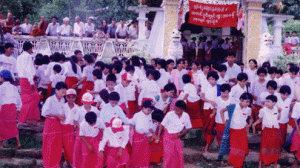By LAWI WENG - After a meeting held yesterday in Rangoon, five ethnic political parties came to a decision to propose ethnic education be taught at the government schools during the next session of parliament.
Nai Ngwe Thein, the chairman of the All Mon Region Democracy Party (AMDP), said, “We have written the proposal very well so they [the new government]can not reject it this time. We will propose [this issue] at the next session of parliament.”
 The five political parties are the Shan Nationalities Democratic Party, the AMDP, the Rakhine Nationalities Development Party, the Chin National Party and the Phalon-Sawaw Democratic Party.
The five political parties are the Shan Nationalities Democratic Party, the AMDP, the Rakhine Nationalities Development Party, the Chin National Party and the Phalon-Sawaw Democratic Party.
This group has agreed that three languages need to be taught in the government schools; Burmese, the local ethnic language, and English.
“The ethnic children who can not speak Burmese, they have to learn Burmese. And also, the Burmese who can not speak the ethnic language, they have to learn the ethnic as well,” Nai Ngwe Thein said.
In March, during the first session of parliament in Naypyidaw, Banya Aung Moe, a member of the National Parliament, and also a member of the AMDP, made a request for ethnic language to be taught at the government schools.
However, his proposal was rejected because he was unable to answer questions on the current ethnic education situation.
Mon community leaders said that ethnic education is also important and should be taught during the new government, but most believe that the new government will not add ethnic education as an academic subject at the government schools.
Dr. Min Kyi Win, a senior member of the Mon Literature and Culture Committee, and a former political prisoner, who wished to remain anonymous, said, “I do not think the new government will allow the ethnic language to be taught at schools as the 2008 constitution did not include the subject.
The state government can not do it according to the constitution. I only saw in the constitution about the state government promoting libraries and museums,” he said.
A well known Mon writer and also, the former head of the middle school in Mudon Township said that she also does not think the government will add ethnic language to the subjects taught at government schools.
“They have already removed the ethnic subject when we were young at school. I do not think they will add it again because they have already moved it,” she said.
Ethnic education in Burmese government schools was allowed until Ne Win’s military coup in 1962. After that, ethnic education was banned at government schools.
After removed the teaching of ethnic languages in school, ethnic community leaders in Burma had to struggle hard in order to maintain their language up to the present.
“We are teaching [ethnic language] at summer schools as we intend to maintain our literature. We have many difficulties when we run these summer schools because we do not have space.
We have to teach under the shade of rubber plantation in some places, or even teach in houses or even monasteries. They [the government] have their schools, but they do not allow us to use them,” said Dr. Min Kyi Win.



